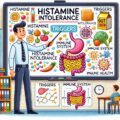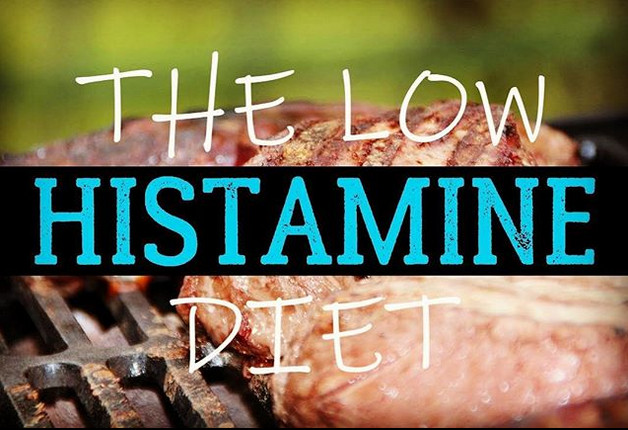Histamine Intolerance Unmasked- Hidden Causes Explained
 Have you heard about histamine intolerance but don’t really know what causes it? If so, this article will just be what you were looking for. I will go over all the things that cause someone to become histamine intolerant and give you some pointers about what to do. This will help you make changes to reduce your symptoms and improve your quality of life. Before going into my list of causes, let’s discuss what chain of events can lead to histamine intolerance.
Have you heard about histamine intolerance but don’t really know what causes it? If so, this article will just be what you were looking for. I will go over all the things that cause someone to become histamine intolerant and give you some pointers about what to do. This will help you make changes to reduce your symptoms and improve your quality of life. Before going into my list of causes, let’s discuss what chain of events can lead to histamine intolerance.
Origin of Histamine Intolerance Symptoms
In certain people, levels of histamine get out of control. As I will explain below, this can happen for several reasons. Once it does happen, the body becomes extremely sensitive to histamine in any form. In addition, it becomes sensitive to things that cause the body to release histamine internally. In short, when blood levels of histamine are high, the body is on high alert. It then starts to react to things in ways it shouldn’t and perceives simple things like foods as threats. This is when the mast cell domino effect starts. and once it gains some steam, it’s hard to stop.
To escape the histamine intolerance trap, you must identify what’s causing the immune flares. In this article, you will learn of the most common causes and triggers so you can make changes and keep your histamine levels low. Let’s take a look at the section below to get started.
Primary Causes of Histamine Intolerance
In the section below, I will discuss the leading causes of histamine intolerance. This will help you understand what causes your histamine issue and how to control the symptoms. Take a look below.
Antibiotics Used When Gut was Already Compromised
If the gut is already compromised, antibiotics can push your immune system over the edge. This allows pathogenic bacteria to grow back faster than good bacteria, setting you up for an inflammatory cycle that will be hard to escape.
This is what happened to me. My histamine tolerance was initially caused by four years of daily antibiotic use for acne. Eventually, once my body got sicker and sicker, they put me on stronger antibiotics until I was pushed over the edge. From there on, my histamine intolerance was in full effect, and it took years to recover.
Chronic Exposure to Mold Mycotoxins
Believe it or not, mold exposure is extremely common when you have histamine issues. The reason is, some mold mycotoxins have proteins in them that make mast cells go crazy! If you are sensitive to mold and become exposed to it, the mast cells start to send out histamine and tons of other inflammatory chemicals that cause your symptoms. Once the immune system becomes sensitized to that particular mycotoxin, it can be easily re-triggered when you are exposed.
In some cases, you cannot overcome the histamine intolerance symptoms until you eliminate mold exposure. This was the case for my daughter, who was literally disabled due to her mold sensitivity and then eventually recovered. Trust me, if you are experiencing signs of high histamine, you must check your indoor air quality. Odds are, there is something lurking in your place that is contributing to your issues.
Level Levels of DAO Enzyme
Typically people who have high histamine also have lower levels of DAO. This is because DAO is responsible for keeping histamine levels in check. Rather than supplement with DAO, it’s important to find the things that are compromising your DAO production. One of these things would be too much meat intake. When the body consumes meat, it lowers DAO levels which leads to more histamine buildup. If you reduce your meat intake and increase plant fiber, you will process histamine better.
Another method for keeping your DAO levels high is to identify all of your hidden food triggers. The reason is, every time you are triggered by a food sensitivity, your body releases extremely high amounts of DAO to compensate for it. This depletes the storage of DAO, which leaves you susceptible to an increase in histamine. These trigger foods are the MAIN thing draining your DAO levels. If you remove them, you will be lightyears ahead of someone who doesn’t. To learn more about how to do this, read about the plant-based elimination diet.
Overgrowth of Pathogens in the Gut
Certain pathogens produce by-products that aggravate the immune system. Once the immune system recognizes the byproduct, it releases histamine. This then adds to the overall histamine load in the body. Once the histamine bucket is overflowing, you experience symptoms.
Though pathogens are an important part of histamine intolerance, they should not be the primary focus. The reason is, they are not the main things that cause histamine release. Don’t get me wrong; they’re not helping it, but they are not the target. Learn more about targeting the immune system rather than pathogens in this article.
Low Levels of immune-Modulating Strains in Gut
Many things can reduce the levels of healthy bacteria in your gut. Some of the most common reasons are chronic stress, antibiotic use, a low-fiber diet, medication, and so on. Once your immunomodulatory bacteria are reduced, it isn’t pretty. Gradually, the mast cells secrete more and more histamine. Over time, systemic inflammation increases, and you start to experience more symptoms.
The most important bacteria are the bifidobacterium. They degrade histamine in the gut and keep the mast cells calm. There are a few others but if you have sufficient levels of bifido, you should be OK. To accomplish this, you need a bifido supplement, a wide variety of prebiotics, and a diet high in fiber. To learn about the best prebiotics, read the article link provided.
Too Much Meat and Animal Products in the Diet
Most people who have histamine intolerance also have low stomach acid. This means they have a tough time breaking down animal products like meat. When it is consumed but not fully digested, it rots in the stomach and causes the release of various inflammatory chemicals. In addition, it makes the gut overly acidic and discourages the growth of beneficial bacteria.
Are you convinced that meat is the only thing that agrees with your body? This is a common belief among people who have a meat-dominant diet. The reality is, after eating meat for a while, the bacterial balance shifts so that it can support the digestion of the meat. If this happens, then fibers become harder to tolerate. These fibers are essential to feed good bacteria, which keep the immune system calm and the body healthy. Without proper amounts of fiber, the inflammation gradually grows.
Synthetic Supplements or Medication
Anything synthetic can trigger the immune system when it is already under stress. If histamine levels are elevated, the only medications or supplements I would take are those that lower histamine. If a supplement hasn’t been proven in a study to lower histamine or modulate mast cells, then I would not take it.
Be aware that many medications or supplements may initially seem to be helping but then turn on you a couple of weeks later. It is always important to reevaluate the performance of your supplements and medication after a couple of weeks. For people who have histamine intolerance or mast cell activation, these things can often cause hidden sensitivities, which makes things worse in the long run.
Hidden Food Sensitivities
Almost everyone who has histamine intolerance is consuming something they are sensitive to. The problem is that many of these foods have proteins within them that are hard to digest when the gut is compromised. If the person consumes the food each day, eventually, the body becomes reactive to it. The person most often fails to recognize it because they initially agreed with the food. In addition, there are usually so many ingredients in the mix that it is hard to isolate.
To overcome your food triggers, you must implement a plant-based elimination diet. This will allow you to identify the foods that truly agree with you and the ones that are aggravating your symptoms. If interested, read the article linked for more information about implementing a plant-based elimination diet. It has been a game changer for myself, my daughter, and many clients.
Chronic Stress without Proper Coping Mechanisms
Histamine may make you feel alert, but it also makes you stressed. People with histamine tolerance are typically in a chronic state of fight-or-flight. When the wrong amount of stress is encountered, it can send them into a trigger episode that is often hard to escape.
When you have histamine intolerance, you must have proper stress reduction techniques. My favorite is deep breathing for an extended period of time. This has truly changed my life and allowed me to react differently to environmental stressors. To learn more about slow deep breathing, read my article linked. Do not overlook this, it is in a league of it’s own.
A Diet that is Low in Plant Fiber
When someone eats a diet low in fiber, they are not feeding the good bacteria in their gut enough. These fiber-consuming bacteria are responsible for degrading histamine in the gut and keeping things in check. If you continue to eat a diet that is animal products or sugars, things will continue to get worse unless you are forced to make changes. The solution is actually easier than you think: just eat a bunch of plants! Eventually, you will get used to it!
Gradually introduce more plants as you reduce your consumption of meat and other animal products. Keep in mind that it may take a couple of months to really get used to a fiber-dominant diet. Be patient and commit to the plant-based way of life. In time, the relief will come.
Diet High in Histamine, Nuts, Spices, Artificial Ingredients, Processed Foods, etc.
If you have histamine tolerance, you must avoid foods with strong flavors. The reason is, these things can set your immune system off. Examples are cane sugar, spices, sweeteners, artificial flavors, or anything strong tasting or smelling. Trust me, it’s not worth how good it tastes. It will send your immune system into a flare that is more frustrating than the food is satisfying.
With this in mind, you must keep your diet bland and low in ingredients at each meal. This will allow you to identify what foods are really triggering you so you can make the changes. Once you make the changes, your immune system will calm down and initiate the healing process.
Eating the Same Foods Every Day for Extended Periods
If you eat the same foods daily, there is a high probability of developing a sensitivity to them. This is because some of these foods have proteins that are harder to break down. When these proteins are not fully digested, they can cause the mast cells to release histamine, worsening symptoms. One example of this is gluten, which is also a protein. Since it is hard to digest, it can eventually cause a sensitivity if consumed too frequently.
To be able to avoid this, you must focus on consuming foods that have low allergy potential. To learn more about this, read my article about the hypoallergenic food list. It will show you a list of the plant-based foods that are easiest for your body to break down.
Genetic Predisposition Triggered by Environmental Stressor
Some people have a genetic predisposition that can be triggered by certain stressors like antibiotics or vaccines. If the gene mutates, it can prevent them from detoxifying properly. If you are one of these people, you must be extremely cautious about things like mold, mycotoxins, fragrances, cleaning products, chemicals, or anything synthetic. In these people, toxic substances can accumulate and interfere with the body’s proper functioning.
The most important thing you can do in these situations is to be aware of what is causing the flare-ups when they occur. Examine food intake, indoor air quality, emotional stressors and more. If you can identify what was causing the problem, you can start to make changes. Though there are ways to improve detoxification, identifying why symptoms are triggered and making changes is the most important thing. Once you clearly identify these things and stop them from causing future issues, then you can start with the proper supplements.
Frequently Asked Questions – Causes of Histamine Intolerance
Is mold common in people with histamine intolerance?
Yes, mold sensitivity is far more common than you would ever believe. I would say at least half of histamine intolerance cases have some degree of mold sensitivity present. I was one of them, and so was my daughter.
Is the low histamine diet the best approach for histamine intolerance?
At first, the low histamine diet can be a good tool for improving symptoms. Once you want to get serious, try the plant-based elimination diet. This can help you identify which foods are triggering you, and which ones agree with you. From there, it is up to you to make the right decisions.
Which supplements are safe for histamine intolerance?
Every supplement you take must be natural and proven to modulate mast cells. If it is synthetic or has NOT been PROVEN to calm the immune system down, it is a risk. The key point to remember is, LESS IS MORE. You do not need to be taking several supplements per day to beat histamine intolerance. If you want an idea of what supplements I used, read my article where I discuss my favorite histamine intolerance supplements. It will at least give you somewhere to start once everything is in order.
How do I know there is an indoor air quality issue?
The simplest way is to leave your current home for a week or two and see how you feel when you go somewhere else. Do you best to be in the most optimal conditions so you have a proper control for your test. If you’re feeling better a week after leaving and have been eating mostly the same, you then need to see how you feel when you get back. When you return, evaluate your symptoms after a week and see what has worsened. From there, you can typically see how big of an issue you have.
If you want me to perform a more professional test, there are plenty. There is the ERMI, box collection test, mycotoxin swab, and others. You can also do an indoor mold test with a petri dish, which is an inexpensive way to assess air quality. This can be a game changer if you perform the collection process properly.
What is the best technique for managing acute stress?
Slow deep breathing is the most effective way to exit the fight or flight response. By learning to take a slow deep breath repeatedly in the middle of stressful situations, you can stop the momentum before it compounds. Keep in mind, you can do this without anyone recognizing it, in any situation, with your eyes wide open. Learn more about slow deep breathing in the article linked.
Can histamine intolerance be cured?
Your goal is not to cure histamine intolerance. It is to live a symptom-free life. If you must make a few changes to accomplish this, so be it. Be willing to make whatever change is necessary to become healthy. Don’t try to go back to how you were living before and mask your symptoms with supplements or medication. This is a mistake I made for several years! Though I was able to control my symptoms to some extent, it wasn’t worth it in the end.
Beat Histamine Intolerance by Listening to Your Body
I remember when I first learned that I had all the signs of histamine intolerance. It was like a revelation from above. I realize that the majority of my symptoms were due to high histamine and overactive mast cells. This understanding was essential to my recovery. Without it, I would have still been lost and looking for the answer.
The key point to take away from this article is, even if you do have histamine intolerance, you still have control over the symptoms. As long as you are hyper-aware of what you are doing and how it affects you, you can make the changes to keep yourself stable. Remember, the answer to histamine intolerance isn’t in a supplement bottle; it’s within you. Listen to your body, and let it lead you towards your recovery, one decision at a time, one day at a time.
If you have questions about histamine intolerance or anything else, get in touch. I understand what it’s like to be in your situation and what it takes to overcome it.
Happy healing everyone!
Matt Nedin, B.S.
Certified Holistic Nutritionist
EndSickness, Founder
Phone: (734) 846-8619
WhatsApp: +17348468619
Email: endsickness@gmail.com












